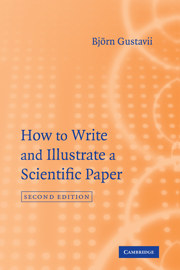Book contents
- Frontmatter
- Contents
- Preface
- Acknowledgments
- 1 Basic rules of writing
- 2 Comments on scientific language
- 3 Drafting the manuscript
- 4 Choosing a journal
- 5 Preparing a graph
- 6 Drawings
- 7 Figure legends
- 8 How to design tables
- 9 Title
- 10 Authors
- 11 Abstract
- 12 Introduction
- 13 Methods
- 14 Results
- 15 Discussion
- 16 Acknowledgments
- 17 References
- 18 Ph.D. and other doctoral theses
- 19 Letters and case reports
- 20 Numbers
- 21 Abbreviations
- 22 How to present statistical results
- 23 Typing
- 24 Dealing with editors and referees
- 25 Correcting proofs
- 26 Authors‘ responsibilities
- Literature needed on your desk
- Further reading
- Literature cited
- Index
24 - Dealing with editors and referees
Published online by Cambridge University Press: 05 June 2012
- Frontmatter
- Contents
- Preface
- Acknowledgments
- 1 Basic rules of writing
- 2 Comments on scientific language
- 3 Drafting the manuscript
- 4 Choosing a journal
- 5 Preparing a graph
- 6 Drawings
- 7 Figure legends
- 8 How to design tables
- 9 Title
- 10 Authors
- 11 Abstract
- 12 Introduction
- 13 Methods
- 14 Results
- 15 Discussion
- 16 Acknowledgments
- 17 References
- 18 Ph.D. and other doctoral theses
- 19 Letters and case reports
- 20 Numbers
- 21 Abbreviations
- 22 How to present statistical results
- 23 Typing
- 24 Dealing with editors and referees
- 25 Correcting proofs
- 26 Authors‘ responsibilities
- Literature needed on your desk
- Further reading
- Literature cited
- Index
Summary
Here is a question from a course participant:
Am I entirely left to the tender mercies of the editors and the referees? Or do I dare to argue for my own view when I feel that the referee might have misunderstood a certain point? Am I impolite if I do so?
No, you aren't – if you do it politely. Thus not exactly in the way quoted below from a covering letter to the editor of Cardiovascular Research (Hearse and the Editorial Team 1992):
Many of the “problems” the referee had with our manuscript appear to stem from his limited understanding of electro-physiology or from our failure to explain observations at a more basic level.
In this case the referee happened to be a most eminent researcher in electrophysiology. Try instead to write as though the referee were God the Father Himself. But don't hesitate to make your point:
Thank you for the constructive criticism of my paper. Here are my comments on the referee's suggestions.
Page 3, lines 2–5. What I wanted to say here was …
I have rewritten this passage to make my point of view more clear.
Page 4, lines 3–5☠
Don't forget that the referee might have sacrificed hours of unpaid effort on your manuscript.
Do referees delay?
Here is another question from a course participant:
How big is the risk that the paper goes to a competitor who delays the whole thing?
That referees delay publication while they incorporate the ideas of the refereed work into their own publication is extremely rare. With few exceptions, referees are honorable men and women.
If these words do not allay your fears, what can you do to protect your ideas from being stolen?
- Type
- Chapter
- Information
- How to Write and Illustrate a Scientific Paper , pp. 132 - 136Publisher: Cambridge University PressPrint publication year: 2008



